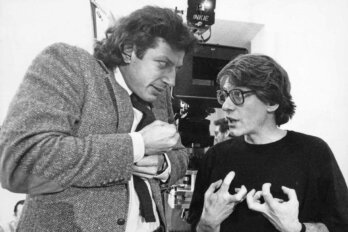Four months ago, the poet Geoffrey Hill died at the age of eighty-four. For the last two decades of his life, he was a poet regularly ballyhooed in print as “England’s greatest living poet.” So great was his reputation that few of the tributes to his passing were inclined to qualify the scope of his contribution to modern letters. Here, for example, is Andrew Motion, England’s former poet laureate, writing in the Guardian: “[He] was one of the greatest English language poets of the last 70-odd years, and time may well prove him the greatest of all.” The greatest of them all! If Motion is right, Hill effectively relegated Eliot, Auden, Frost, Plath, and Ted Hughes to the status of also-rans.
Also in the Guardian, the current poet laureate, Carol Ann Duffy (to whom Hill famously delivered a very public whipping for her suggestion that tweets constituted, at least potentially, a legitimate form of poetry), called him “a saint and a warrior who never gave an inch in his crusade to reach poetic truth.” What Duffy characterizes as a “refusal to give an inch” merely hints at the singular dimension of Hill’s career and reputation, one consistently featured in his obits: that he was one of the most difficult poets, living or dead, to ever put pen to paper. He was so difficult that even the American poet and critic William Logan, a standard bearer for difficulty in poetry, was moved recently to venture the following:
For more than 50 years . . . Hill has written a pinch-mouthed, grave-digger’s poetry so rich and allusive his books are normally greeted by gouts of praise from critics and the bewilderment of readers who might have been happier with a tract on the mating rituals of the earwig.
Hill has made brutally plain that the common reader is of no interest to him. Indeed, he believes that sinking to common ground betrays the high purpose of verse; with a withering pride he has refused, time and again, to stoop to such betrayals. This has made him a poet more despised than admired, and more admired than loved.
If Hill’s poetry is notoriously difficult, the reasons behind that difficulty are not. Most obvious among them is the fact that, for Hill, the alternative is simply unworthy of endeavour. “An individual voice,” Hill once observed, “battles for its identity amid a turmoil of public speech and media noise, a crowded wilderness of acoustical din.” Hill, of course, isn’t alone in decrying the toxicity of the acoustical din. A great deal of poetry prides itself on the distance it keeps from the marketplace—from a mob nursed on bread and circuses, temperamentally disinclined to long abide anything that smacks of hidden meaning.
Poetry’s general antipathy to the “turmoil of public speech” has been exacerbated by developments in the twentieth century, particularly the rise of mass culture. Hill, we have to remember, came of age at the height of the influence of cultural critics like Adorno and Horkheimer, who famously argued that the rise of mass media was ultimately anti-democratic in that its business was to wed its audience to the status quo. For Adorno and Horkheimer, mass media transforms culture into an ideological medium of domination.
Hill obviously agreed. Here he is responding to the question of why his poetry is so fraught with esoteric language and archaic forms of speech: “The language [my critics] think of as democratic anti-elitist are really the scraps of the English language that have dropped from the feasting tables of the oligarchs. This sort of ordinary-language poetry isn’t democratic at all: it’s servile. Yes, servile.”
As the reference to “feasting tables of the oligarchs” suggests, Hill viewed art in general, and poetry in particular, as a political instrument, a way not merely for the individual voice to find itself but to keep the jackboots of tyranny from kicking in the doors of society itself. And in this, the age that has given us Donald Trump, aren’t we all currently living through a vivid object lesson in the how the degradation of public speech fosters barbarism?
If difficulty has always been a feature of poetry, great difficulty has been a part of poetry at least since the advent of Modernism. Think of Eliot’s “The Waste Land” which, without its footnotes, would be incomplete, if not entirely incomprehensible. Think of the exuberantly inpenetrable Getrude Stein or of Pound’s Cantos, the latter so larded with buried meaning that armies of graduate students are still mining it for hitherto undisclosed connections. Poetry, the argument goes, got more difficult because the world got more difficult. Only a modernist like Wallace Stevens could therefore venture a maxim like the following and be perfectly understood: “The poem must resist the intelligence / Almost successfully.” The level of din associated with the zeitgeist that gave us modernism, however, would barely register as audible in the postmodern age in which Hill rose to fame.
But to appreciate fully the perverse difficulty of Hill’s aesthetic enterprise you have to factor in the degree to which poetry has slipped from its former glory as first among the arts to something read by almost no one. According to a 2015 US government survey, the audience for poetry has declined by more than half in recent years, from a high of about 18 percent in 1992 among those who claimed to have read a work of poetry at least once in the last year to just over 7 percent in 2012. “Over the past 20 years, the downward trend is nearly perfectly linear—and doesn’t show signs of abating,” the Washington Post reported. (If it hasn’t abated, that audience now stands at a sobering 5 percent.)
Please note that the distinguishing qualification of “audience” for poetry here is not an “avid reader” or even “irregular reader.” No, it’s someone who, over the course of the last twelve months, merely had occasion to allow their eyes to rest on a work of poetry, even in passing, even on the bus, even during the best efforts of National Poetry Month, even while online. Given that radical falling off interest, poetry has of late in the main adjusted it sights downward. “The fewer its readers,” notes William Logan, “the easier most poetry gets, trying to tempt back the lost souls seduced by narrative or the frisson of memoir, to say nothing of entertainments or disciplines that require no reading at all.”
So how did a poet of perverse difficulty manage to secure a reputation as the greatest poet in England, and possibly in the history of English literature, in this, an age in which poetry has fallen so low in the general estimation as to rank behind knitting as a worthwhile investment of one’s time? How should we account for the manifestly inverse relationship between the general—and growing—intolerance of difficulty in poetry with the level of veneration lavished on one of history’s most difficult poets?
Well, call me cynical, but as someone who has tried to read his late work (and failed, then failed to fail better) my suspicion is that Geoffrey Hill’s reputation is founded on a widespread failure to read him. Indeed, I’d be willing to wager that even among the many who have rushed to anoint him Bard of the Ages, scarcely a handful have actually managed to hack their way through what may be his most important book-length poem, “Speech! Speech!” And while we’re in a gambling mood, I’d also bet that, as far as the wider world of readers is concerned, fewer have come to grips with that poem since it was written in 2001 than in the last hour have happily sat through a viewing of the Youtube video of Billy Collins reading his aggressively comprehensible poem, “The Lanyard” (at last count 302,748 views).
Even to other poets—the people who very likely comprise today’s main audience for poetry—Hill is a figure who, in his Jeremiadical commitment to singing songs unsullied by the boorishness of these fallen times, in his warrior-like defense of the various ways of speaking that inform what Eliot called “the Tradition,” serves to remind us all of what poetry once was and what it shows so few signs of ever being again. But maybe that’s a good thing. And if not good, at least understandable.
In his recently published book-length essay, The Hatred of Poetry, the American poet and novelist Ben Lerner takes his point of departure from the poet Marianne Moore’s famously ironic estimation of poetry (“I, too, dislike it”) and makes the point that when poetry stops being difficult, it stops being poetry. Why? Because as a form of art, poetry has been obliged, from the get go, to negotiate what Lerner calls (after Allen Grossman) an “undecidable conflict” which goes something like this: “You’re moved to write a poem, you feel called upon to sing, because of that transcendental impulse [to represent the unrepresentable]. But as soon as you move from that impulse to the actual poem, the song of the infinite is compromised by the finitude of its terms.”
The problem, you see, lies with that damned actual. The result of the damned actual is that poetry “is an impulse that can produce no adequate examples.” Poetry isn’t, therefore, merely hard, it’s impossible.
One of the abundantly obvious consequences of this impossible fly buzzing perversely in the unguent is that “real” poetry is, as an art form, inherently disinclined to court the favour of its potential audience. “What kind of art,” asks Lerner, “assumes the dislike of its audience and what kind of artist aligns herself with that dislike, even encourages it? An art hated from without and within.” But here’s the thing: The hatred of which Lerner speaks is not so much the hatred of poetry as the hatred of the materials the poet has at hand to get at the transcendent truth we are so given to imagine lies behind the surface of things. Hence Dickinson’s “Tell all the truth but tell it slant,” or Keats’s “unheard melodies are sweeter” (or, to put in terms even the clapper-clawing palms of we vulgar might appreciate, the risk a raider in Nazi uniform might run in peering under the lid of a lost ark).
So, oh audience member, if you think you get what a particular poem is offering, then it’s likely you’ve pretty much missed it. Conversely, if you know you’ve missed it, then there’s at least the ghost of a chance that you actually got it.
Adding, however, to the confusion over the matter of difficulty in poetry is the fairly obvious fact that the sort of difficulty that makes real poetry happen bears an uncanny resemblance to the confused and confusing difficulties that lead to bad poetry. To cite an example close to home, is your average reader to do with most of the poetry in Kenneth Babstock’s Griffin prize-winning collection Methodist Hatchet? Are the poems, as the publisher claims, “Marooned in the shiftless, unnamed space between a map of the world and a world of false maps . . . sing[ing] their own bewilderment?” Are the poems bewildering in the strong sense, or merely bewildered? Well, given that we’re being pointed in the direction of something that is impossible to describe, it’s difficult to say. All of which brings us back to the death of Geoffrey Hill and what we’re to make of his passing.
It seems to me that mourning his loss in the terms Motion, Duffy and so many others offered is not an act of bad faith (as in making the solemn claim that Proust is the greatest writer of all time when the person making that claim left off reading Proust halfway through Swann’s Way). Rather, it amounts to a gesture of respect for the dignity of poetry’s if not lost then certainly its perennially-threatened office. If you listen closely, you can hear that curious admixture of respect, mild embarrassment, and nostalgia in nearly all of his obituaries. It was not only Hill the world came to praise and bury, but poetry itself.





